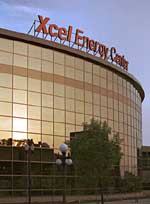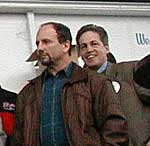By William Wilcoxen
Minnesota Public Radio
December 24, 2001
|
| RealAudio |
Randy Kelly's inauguration as the new mayor of St. Paul on Jan. 2 will bring a close to Norm Coleman's leadership of the capital city. The last eight years have been a period of prosperity for many - but not all - of St. Paul's residents. It remains to be seen how history will judge Coleman's tenure, but many of his supporters think he will rank as one of the city's most effective mayors.
| |
|
|
|
||
As he packs his mementos from eight years in city hall, Norm Coleman says he's proud to leave St. Paul in better shape than it was when he arrived in office. But then, the city was pretty bad off when he arrived. State Rep. Andy Dawkins, who lost to Coleman in the 1993 mayor's race, says eight years ago the outlook in St. Paul was bleak, and pessimism was rampant.
"We had a sense of businesses leaving downtown St. Paul. That the downtown tax base was eroding. That we were going to be a city not just with boarded-up houses in the neighborhoods, but with boarded-up buildings downtown," Dawkins says.
As Coleman took office, the economy began to rebound. Under his leadership, St. Paul enjoyed a development boom that included construction of the new Science Museum of Minnesota, the arena that's home to the new pro hockey team, a new convention center, downtown office buildings, and a variety of smaller projects. Coleman says the physical changes in the city were significant. But he thinks an intangible one is even bigger.
"Changes in attitude are more important," says Coleman. "If people are optimistic and they're upbeat and they're positive, then there's the potential for things that I can't even imagine. Someone else will come up with the idea. But you've got to have that good environment, and that's what we helped shape."
Even some long time St. Paul boosters say their confidence in the city was flagging in the early 1990s. Betsy Bockstruck, whose family has run a jewelry store downtown for more than 100 years, says Coleman helped reverse a feeling that the city was floundering.
| |
|
|
|
||
"The fact that he had a vision that we could be better," says Bockstruck. "We always (felt) Minneapolis was always better - we could never compete. But he said 'I have a vision for St. Paul and here's what we're going to do.'"
Redeveloping the Mississippi riverfront was at the top of Coleman's "to do" list. Many industries had recently abandoned the riverbanks. Coleman says he embraced the idea of refurbishing the area to attract residents and visitors, after several advisors suggested it.
"I looked at it and said 'Yes, we could do it. And it's an important thing because I'm looking for a uniter. I'm looking for something people can rally around. Because when they rally around something they get fired up.' It could have been anything, but it was the river. In the end it was the right thing, and it made sense."
In addition to the science museum and arena complex, riverfront projects included renovating Harriet Island Park and planting more than 30,000 trees and shrubs. New business and non-profit groups sprouted and contributed to the revitalization. In city hall the phrase "downtown riverfront development" came to encompass changes across most of the business district - from the Mississippi to the state Capitol.
Business leaders responded well to Coleman, who took several steps that appealed to them. He cut city employees' retirement benefits, saying the agreement he inherited would have bankrupted St. Paul. He streamlined the process for getting business permits and licenses.
|
"You have a mayor who...went out and made his objective to grow the city, to create jobs. It's a pleasure to see - I hate to put it this way - but a politician who lives up to his word.""
- Ecolab CEO Al Schuman, on Norm Coleman |
He campaigned against a proposed jobs program he said would have created an expensive bureaucracy. And he submitted eight budgets that contained no increase in the city property tax levy. But, here again, Coleman says the intangible connections forged in corporate boardrooms were as important as the concrete changes.
"A lot of this is personal stuff. It's about having relations with the CEOs. I did that and the next mayor has to do that. You've got to know the folks that grow jobs," Coleman says.
Earlier this month, the Capital City Partnership threw a thank-you party for Coleman. The group is a collection of Twin Cities CEOs working to improve St. Paul business prospects. It includes Doug Leatherdale, who guided the city's biggest private sector employer, the St. Paul Companies, during most of Coleman's tenure.
Strong economy notwithstanding, Leatherdale thinks very little of St. Paul's recent development would have occurred without Mayor Coleman's leadership.
"He has the vision. He has the energy, the enthusiasm, and the know-how to make it happen. And it does happen," says Leatherdale. "I think people in the business community saw that characteristic in Norm very early.
"We came together and built the Capital City Partnership, and that was really the catalyst that started so much of what we have today."
"Here you have a mayor who took his job seriously, who went out and made his objective to grow the city, to create jobs," says Ecolab chief executive Al Schuman. "And that's what he did. It's a pleasure to see - I hate to put it this way - but a politician who lives up to his word."
| |
|
|
|
||
While members of the business elite see Coleman as one of the best mayors St. Paul has had, advocates for the poor sing a different tune.
"Some people win and some people lose. And the people I hold dear to my heart are the ones that are losing," says Caty Royce, director of the Community Stabilization Council.
Royce helps poor people find and keep affordable housing. She says during Coleman's two terms, St. Paul developed the worst housing crisis the city has known. New houses have gone up. But Royce says in many cases expensive homes have replaced ones that were affordable to people with low incomes.
"Norm's strategies for redevelopment have, in fact, intersected in a very negative way with poor people's lives," she says.
Coleman's former opponent, Andy Dawkins, agrees, saying the mayor has stoked optimism among the successful - but spent little on helping the poor.
Coleman says instead of accommodating poverty, he has sought to help poor people improve their lot, especially by creating jobs. Coleman says he believes a rising tide lifts all boats, but concedes some rise faster than others.
Perhaps the most persistent critic of Coleman has been a former Hofstra University classmate and St. Paul real estate developer, John Manillo. Manillo maintains that several Coleman-led projects contain hidden costs that could come back to haunt the city, particularly in a sour economy. He says Coleman's political ambition has given him a taste for impressive but expensive projects, that Manillo says are not necessarily in St. Paul's long-term interests.
|
"Norm Coleman has run for mayor of St. Paul as a stepping stone to higher office. Everything Coleman has done was based on primarily what is good for the next campaign."
- Coleman critic John Manillo |
"Norm Coleman has run for mayor of St. Paul as a stepping stone to higher office. It was clear from the beginning that's what his intent was. So everything Coleman has done was based on primarily what is good for the next campaign," Manillo says.
Coleman switched from the DFL to the Republican party during his first term. He finished second to Jesse Ventura in the 1998 governor's race, and will challenge incumbent U.S. Sen. Paul Wellstone next fall. Coleman says his campaigns are based on having provided sound leadership in St. Paul. He says the complaints about his fiscal management are not valid.
"We got the first triple-A bond rating in the history of the city. You'd have to think the folks at Standard and Poor's are morons to buy what the critics have to say," he says.
Coleman will start work with a law firm in the new year, and is already raising money for his senate campaign. Regardless of what his future holds, he says he will look back fondly on his days as mayor of St. Paul.
"It's the greatest job in the world. I'll never have as good a job as I've had. Because this is one where you're really close to the people," Coleman says. "When things don't get done they let you know. But you want to know something? When things do get done they also let you know. And I've been very fortunate that a lot of good things have been done."
Norm Coleman leaves office on Jan. 2, when Randy Kelly is sworn in as the new mayor of St. Paul.



